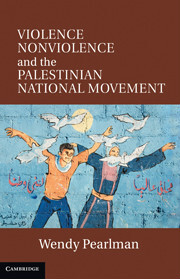The Electronic Intifada 11 February 2004
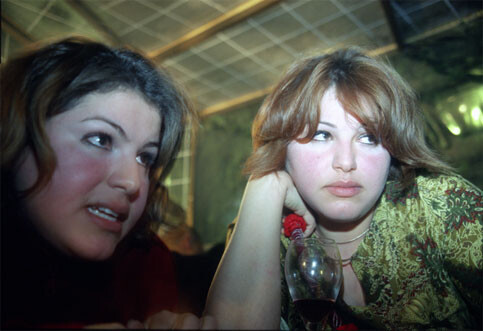
Suzanne (right) with her twin Jehan: “Nobody likes killing, nobody likes blood. But we can’t just stand back and watch the soldiers and the settlers march in forever.” (Photo: Laura Junka)
“It’s almost a shame that this book has to be written, to [have to] try to say, ‘Palestinians are decent human beings and are not all terrorists and hate mongers,’” Wendy Pearlman tells me over tea and hot cocoa during a cold, snowy winter day in Chicago.
I know where Pearlman’s coming from, the endemic frustration experienced by the Palestinian sympathizer who has to expend so much energy explaining to other Americans that Palestinians are indeed regular people who have cares and concerns just like anyone else — except they have the extraordinary burdens of dispossession and living under foreign military rule.
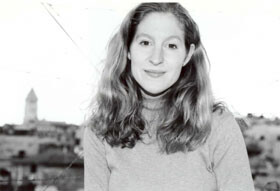
Wendy Pearlman in Jerusalem (Photo: Ala Francis)
Everyday people
Indeed, the interviews reveal the details of peoples’ lives and the nuances of individual personalities that can’t fit in a 600-word Associated Press report. Take the fiery Suzanne, a reporter from Jenin (not to be confused with her twin Jehan, as Pearlman often did while friends with the two at Bir Zeit University). In her interview with Pearlman, Suzanne explains that after the Israelis set up barriers blocking the road to her school, the only way to get to class “was by passing underneath this tunnel. So every day we got down on our hands and knees and crawled through. It was humiliating. Can you imagine? You and you teacher and your classmates — everyone who has to get to school — crouching on their knees … What more can I tell you than that?”
And then there’s Samia, the community volunteer who was “overseeing the Rawdat Al-Zuhur elementary school and its 250 mostly low-income students,” where Pearlman was “struck by the doves and rainbows painted on every wall.” While Samia was working for the YWCA, she would often have to travel to Amman, Jordan, enduring strip searches by Israeli personnel at the border. Samia says, “You know, they have these handheld machines that they could just wave in front and back of you, and they serve the same function. But they choose to strip you, simply in order to humiliate you. One day the security policewoman even removed my sanitary napkin. Can you imagine? She said, ‘I’m sorry. I have to do this.’ I said, ‘I’m sorry for you.’”
Both Jehan and Samia ask Pearlman, “Can you imagine?” and one of Pearlman’s objectives with Occupied Voices is to get readers to do just that. Pearlman tells me, “these are the type of [stories] that might resonate with Americans. To just say Palestinians suffer and they feel like they’re forced to live without dignity, that they’re denied their land and their freedom, is sort of an abstract, difficult thing for an average American to understand.” But with these human illustrations, “people can imagine what it’s like to be in that situation.”
American readers might also be surprised at the warmth that many interviewees feel towards American citizens. Issam, a shy 24-year old taxi driver from Rafah tells Pearlman, “I really like Americans. Those who know the truth understand our situation and sympathize with us. I received medical care thanks to the generosity of the American people, not the American government.”
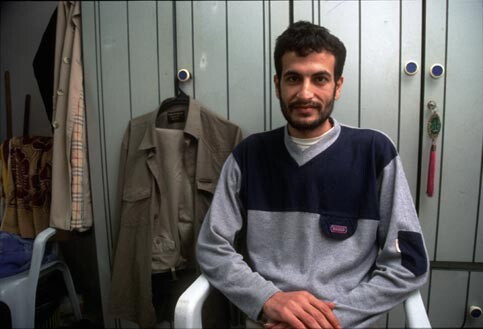
Issam, from Rafah: “Israelis will never be secure until they give us our rights. We aren’t asking for more than our rights.” (Photo: Laura Junka)
Issam, who was shot several times during the first Intifada, adds, “The American government gives Israel weapons that it uses to kill us. Americans pay their taxes to their government, and the government uses it to send arms to Israel. So Americans are unintentionally causing the killing of children. I ask Americans to recognize this truth. I’m not asking for more than that.”
Other interviewees echo this distinction between the American people and their leaders. Pearlman tells me that this was consistent with her experiences in Morocco, the Palestinian territories, and Egypt, that “across the board, people drew a distinction between a quarrel with the United States government and their utter warmth towards me as an American citizen, to the extent that people would say, ‘Excuse me, no offense, but I have some criticism of your government’s policy.’ I was like, ‘So do I!’ I was amazed that people almost felt like they had to apologize — ‘I don’t want to insult you, please don’t take this in any way as a personal disagreement.’”
Adding that she was “treated like royalty and invited into peoples’ homes and lives,” especially in Gaza where “people had nothing, but whatever they had they would give to me,” Pearlman explains, “In Gaza, you’re invited to lunch, and you have to stay for tea, you have dinner and then spend the night. Otherwise it’s eating and running if you don’t leave [until] the next day.”
But, Pearlman says, “I thought that people made the distinction between the American government and American citizens more than was justified… American people elect their government. They have a responsibility… I almost felt like [saying] no, you have a right to criticize the American people for electing the politicians that they do, some for being as apathetic as they are, for not knowing how implicated our government is in the violence that Israel is waging.”
Palestinians in the media
The moderate, diverse Palestinian voices that are featured in Pearlman’s book completely contrast the one-sided image of violent Palestinians in the U.S. mainstream media. This absence in the media of Palestinians explaining who they are and what their goals are is one of the motivations Pearlman had for this book. “When the [Second] Intifada first broke out, I was in Egypt, and I was a complete wreck,” she says. Glued to the T.V. and the Internet, Pearlman writes in her book that the most frustrating aspect was how “the press reported endless assertions about what Palestinians thought and desired, but hardly an interview with actual Palestinians.”
Pearlman stresses this point in our interview, stating, “What bothers me is that people who have never talked to a Palestinian, who have never gone to the West Bank or Gaza, have no problem stating that the Palestinians are fighting for this, Palestinians hate Jews, Palestinians will never be satisfied until they annihilate the state of Israel, you give Palestinians in inch and they take a foot.”
Mentioning that one of the questions that always comes up in her book talks, the “textbook question,” Pearlman quickly asks, “Have they ever looked at a Palestinian textbook? Would they know a Palestinian textbook if it hit them on the head? These things just get spun off and become conventional knowledge that people never stop to think, ‘Where exactly did I learn that Palestinian textbooks teach hate?’”
Pearlman adds that through her Palestinian activism, she’s learned that “in a debate setting, it takes 30 seconds to create a lie, to spin a lie, and then five minutes to disprove it. So in a debate setting, lies win. I feel like that’s something you see in the media. It’s very easy, it takes one sentence, one line, to launch the completely unfair, maybe utterly fabricated, accusation that Palestinian textbooks teach hate — Palestinian mothers send their children out to die.”
She explains, “One sentence, and then it’s out there, and we on the other side have to dedicate reams and reams of paper, our best rhetorical skills, our best evidence, to try to disprove that assertion. So we can never put forward an agenda of our own, a positive agenda trying to create change, because we’re so busy trying to prove that Palestinians are human beings.”
Pearlman mentions, “I’ve had people ask me, ‘What is Birzeit University like?’ because a lot of people, especially Israelis, think Birzeit’s this stronghold of nationalism and you go there and it would be like a bombed out shelter, and the truth is most of the time you have boys and girls flirting. They sit in the cafeteria and they flirt and eat junk food. It’s a college! Of course [there’s] nationalism and they’re fighting for Palestine, but they’re also winking at each other and gossiping and looking at who has new shoes and borrowing each other’s lipstick and talking about sports.”
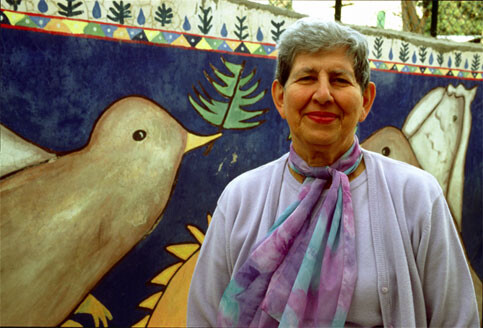
Samia, a community volunteer: “We’re not going to throw the Jews into the sea, and they’re not going to get rid of us. I always say it is like a Catholic marriage: no divorce possible.” (Photo: Laura Junka)
The Jewish thing
But it’s not just Palestinians who find themselves trying to negate a one-dimensional representation of themselves and cliched assumptions. Described on the back of the book as “a young Jewish woman from the American Midwest,” Pearlman finds that a lot of people have written their own narrative for her life. “They have this sort of soap opera movie in their head that I grew up in an orthodox family and I was raised as a Zionist, I went to camp, and then I went to the West Bank and realized that all my images were false, and there was this crisis of identity.
“They’re really searching for this soap opera, which is totally not the story. I grew up in a non-religious, secular but Jewish household. I never felt any sort of affiliation with Israel growing up. I came to this issue as a student of political science studying the Middle East,” Pearlman explains.
Noting that “it’s a personal book, I’m in there as much as everything else … I don’t really have a right to complain,” Pearlman says that she has her last name to thank for getting the book published in the first place. With the U.S.’ obsession with “fair and balanced” representation, even with the Israeli-Palestinian conflict which is completely biased in the first place, Pearlman explains that the taboo of presenting just the Palestinian narrative, without “balancing” it by presenting an equal amount of Israeli voices, is tempered by the fact that she is Jewish.
“I would love to never mention the whole Jewish thing in the whole book,” she tells me. “I would absolutely love … to never have that introduction where I talk about being Jewish, to not open the first two pages saying that I went to Sunday school. When I tell my life story, it’s not ‘when I was seven, I went to Sunday school.’ It wasn’t as important at the time as doing gymnastics.”
Pearlman adds, “But people see the last name and they want that story, and a book publisher knows this is how they’re going to sell the thing. … It’s a packaging, marketing thing, and you really feel like you’re selling yourself.” Imitating a commercial voice-over, Pearlman jokingly says, “I feel like a can of Coca Cola or something — ‘New and Improved, Jew from Nebraska!’”
Although “she has conflicting feelings about that,” Pearlman appreciates “that if you want people to listen to Palestinian voices, this is the game you have to play.” She says, “From a strategic point of view, in the introduction, I try to package this in the way that is most diplomatic and non-threatening, so I can open the door and people will stay with me long enough to read the interviews… So it’s always a strategic consideration, of thinking who’s your audience, and if you want to reach more than the choir, how you have to package this thing so that you affirm people and they are not threatened by it, and they can stay with you to get to the content of what you want to come across.”
However, Pearlman asserts, “it’s ridiculous to me that somehow being Jewish would give… credibility to a book of oral history of Palestinians. What kind of warped world is this?”
Missing the point
Pearlman knew from the get-go that there would be much resistance to a book that just features Palestinian voices. In her introduction, she writes, “I do not doubt that there will be those who read these interviews and quickly retort, ‘Yes, but Israelis have suffered too.’ They will be absolutely right, but they will have missed the point.”
I ask Pearlman if it’s frustrating for her when Publisher’s Weekly criticizes her for only presenting “one side of the story,” and the Palestinians themselves for not wanting to end the Intifada and for viewing the Oslo accords as a “sellout.” “Totally,” Pearlman replies, adding, “I even warned them… and they still miss the point.”
“It’s really frustrating, and I knew this from the start, that a book of interviews with just Palestinians — there’s a huge sector of the population you lose from the bat. The Publisher’s Weekly review was really a complaint about the premise of the book rather than the book itself. [The reviewer] didn’t have to read it… he or she could just look at the title and think that’s enough,” Pearlman explains.
She adds, “You have to present Israeli voices and Palestinian voices equally in order for a piece of material to be [considered] legitimate… People call this a book that’s biased. It’s a recording of peoples’ stories — you’re saying lives are biased? It’s just peoples’ experiences. How can you quarrel with that?”
Pearlman mentions a Jerusalem Post review, which pans the book. “I loved that review,” she says, describing that the review criticized the book for being superficial and one sided, while lauding Raja Shehadeh’s book When the Birds Stopped Singing, which is his own diary of the Intifada. Pearlman says that comparing the two books for depth and nuance isn’t entirely fair because Shahadeh is giving one man’s testimony and she is presenting over two dozen, not meaning the book to be a work of anthropology.
In one paragraph of the review, the Post takes Pearlman to task, asserting, “At times, the reader feels his or her own voices competing with the Palestinians’ voices: What about terrorism? What about moral responsibility? What about Palestinian anti-Semitism? What about the lynching in Ramallah? What about Jewish suffering?” While the review does add, “it is imperative for each of us to hear the other side express itself in its own words,” Pearlman’s reaction suggests that these are questions critical of her book that she hears time and time again.
She says, “Just check those questions. It doesn’t mean that those questions are completely invalid, doesn’t mean that they’re groundless — they’re important, valuable questions because Israelis have also suffered tremendously. But just… stop and listen to what Palestinians have to say in their own terms without second-guessing everything you read and say, ‘But! But!’ Just listen to them. Let them talk, sit back and think about it and then you can reach your own conclusions.”
Pearlman adds, “If you want the conflict to end and you want peace, can you really afford to ignore their points of view? Go ahead; try to make peace without the Palestinians, without understanding Palestinians’ experiences and their goals as they see them. They’re going to be at war for generations — go ahead.”
Reaching more than the choir
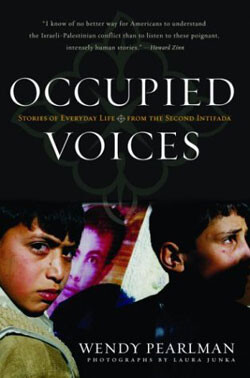
Occupied Voices by Wendy Pearlman
But Pearlman’s first talk, last July, at a Borders in Stanford, Connecticut, was truly her “trial by fire.” Some members of Stanford’s substantial Jewish population got word that there was going to be a book talk by someone sympathetic towards Palestinians, and pressured Borders to cancel the event, e-mailing the bookstore to tell them that Pearlman “was a terrorist supporter,” that having her speak “was an affront to the Jewish community of Stanford.”
Borders, which, as Pearlman points out, is used to having book talks on politically neutral subjects like cooking with garlic, panicked, but didn’t cancel the talk. Instead, they invited all the people who threatened to boycott the store to come to ask questions. Pearlman found herself with about 60 people in the audience, about 40 of them hostile. Of those 40, “I think there was maybe one person who had a copy of the book and said he had read some of it, the others I don’t think even opened it,” Pearlman says.
“But they had questions written on little white pieces of paper, like the one person who bought the book wrote questions for everyone, and it was crazy.” After her half-hour talk, there “was an hour and a half of completely hostile questions. We didn’t have a moderator and a microphone because it was the first [talk] that we did. People were screaming out like crazy.”
Pearlman adds, “But one person said that Palestinians deserve to live with freedom in their own land, and someone screamed out, ‘No! Not people who are evil!’ It was absolutely unreal. But I had some friends there and they said that sometimes the best thing you can do is just let these people talk and discredit themselves.”
Although such an event would cause those with thinner skins to abandon a book tour and perhaps public speaking altogether, Pearlman says, “in some ways, I felt like that Stanford event was the most successful, because it’s the closest thing that came to dialogue. For me it was scary, but it’s more satisfying to speak to a hostile audience than preach to the choir… These guys had to sit and listen to me for half an hour, and then I had to listen to them.”
Inspiration in tragedy
When I ask Pearlman if it was emotionally difficult for her live in the conflict-riddled West Bank and Gaza strip collect the stories of its Palestinian residents, she responds, “This stuff is happening whether I’m going to ask people about it or not,” and that “it was hard, but trying to feel like you’re doing something is what gives me some sort of solace. Even if it’s hearing difficult things or seeing difficult things, there’s some sort of sense that I will try to use these experiences or use the information I’m gathering for something that is my own way of trying to make a contribution.”
Although there is much tragedy, Pearlman is inspired by how people continue to go on with their lives. “They’re still living, families are still together, people are getting married, people are having babies, people are still trying to get their education as much as they can and work as much as they can. When you see the horrors that people are suffering in this situation, you also see the sort of resilience of the human spirit and peoples’ adaptability, and their ability to live with pride, dignity, and even humor,” she explains.
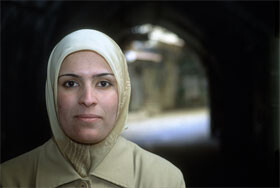
Iman, from Hebron: “We have to stand together and do something to get our freedom. It is when we act as one that we can make a difference.” (Photo: Laura Junka)
Those interviewees who have received a copy of the book and are proficient in English have been “really pleased,” which for Pearlman “is a complete relief.” She mentions that Samia the community volunteer bought about 20 copies and that one of the two East Jerusalem bookstores that sell printed works in English ordered 50 copies, sold out, and then ordered some more.
This is very vindicating for Pearlman, who says she knows little about how the book publishing industry works, and when she did the interviews, “I just plopped out of nowhere, this random girl with a tape recorder, who wants to write a book. I had no idea that it would become a book; I didn’t have contact with a publisher. I didn’t know the first thing about writing a book — I just had a bunch of blank tapes.”
There’s little worry that Pearlman will run out of ideas or steam, as she says that she is fascinated by the many different philosophical, political, economic, and cultural dimensions of the conflict. Acknowledging that she’s in the Israeli-Palestinian issue for the long haul, Pearlman is currently working on her PhD dissertation at Harvard University, which she says probably have some aspect of interviewing. She has also been studying Hebrew, which she demonstrates by singing for me a bit of the traditional song “The Most Beautiful Girl in the Kindergarten.”
I ask Pearlman if she will follow through with the concept of compiling the stories of Israelis and calling it Occupied Voices, as she contemplates doing in her book’s epilogue. She says she does plan on living in Israel in order to get a more sophisticated understanding of the conflict, and to answer the criticism that she only knows one side of the story, and that maybe such a book would come out of it.
Pearlman says, “I’ve got decades, as long as I live, to be involved in this issue. A lot of my American friends who have spent time in the Palestinian territories say, ‘We were happier people before we went to Palestine.’ Ignorance is bliss before you knew such suffering existed. But once you’ve seen it, you can never go back; you can never be completely happy because there’s always some nagging little voice in your heart or over your shoulder saying, ‘remember the people in Palestine right now who don’t have water and can’t leave their houses.’”
Related Links:
Maureen Clare Murphy is an Arts, Music, and Culture correspondent for EI and its sister site eIraq.




